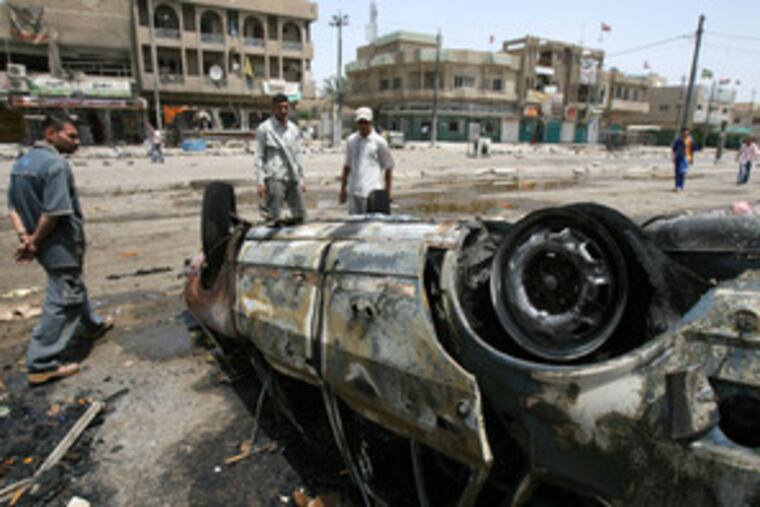12 U.S. soldiers reported killed in Iraq
One commander said the new offensive to quell violence could also bring more troop deaths.

BAGHDAD - Eight American soldiers were killed in roadside bomb attacks yesterday, one of the highest single-day death tolls this year. They were among 12 U.S. soldiers whose deaths were announced on a day when car bombs killed scores of Iraqis across the country, threatening to deepen sectarian tensions.
A senior U.S. commander said yesterday that the military was bracing for a rise in the casualty rate in the coming months, as an ongoing security offensive attempts to tame the catastrophic violence and stabilize Baghdad.
"All of us believe that in the next 90 days, you'll probably see an increase in American casualties because we are taking the fight to the enemy," Maj. Gen. Rick Lynch, commander of the Army's Task Force Marne, told reporters. "This is the only way we can win the fight."
Even as insurgents take aim at U.S. troops, they have stepped up their attacks on so-called soft targets, especially in Shiite areas of Baghdad, in an apparent attempt to stoke sectarian warfare. In the deadliest such attack yesterday, a car bomb explosion tore through one of the capital's biggest markets at midday, killing 42 people, police said. The blast, in the predominantly Shiite neighborhood of Baiyaa, ravaged buildings, scorched vehicles and injured at least 67 people, police said.
Under the new counterinsurgency plan, U.S. soldiers increasingly live in and patrol hostile parts of Baghdad and surrounding areas such as volatile Diyala province, where hundreds of fighters have fled to escape the offensive. The military's goal is to wrest control of neighborhoods and towns from insurgents and militias by winning the trust of and getting information from residents.
But the strategy has multiplied the risks to U.S. soldiers. Insurgents are proving resilient and are drawing on their deep knowledge of the land to wage a guerrilla war with sophisticated tactics such as sniper and suicide attacks and the roadside bombings that kill more Americans in Iraq than any other form of violence.
Lynch said his forces were more frequently encountering powerful roadside bombs called "explosively formed penetrators," or EFPs, which U.S. officials say are of Iranian origin and can pierce the armor of humvees. Other roadside bombs are buried so deep in the ground that they are difficult to find even with high-tech devices, he said.
While U.S. military officials view EFPs as a weapon of Shiite extremists, Lynch said they were also turning up in the hands of Sunni insurgents.
"You got a thinking enemy out there," Lynch added. "As soon we do something to prove our capability, he does something to defeat our capability. It is a continual cycle. That's why I will never rest with our up-armored humvees or our technology."
Still, Lynch predicted that by August or September, U.S. forces would have "a decisive effect on enemy formations."
Lynch said he did not feel the same away about Iraq's political process. "I don't see there will be significant progress on the government side between now and fall," he said. "You can't just build a government overnight."
In yesterday's deadliest attack on U.S. troops, a roadside bomb struck a convoy in Diyala province, killing six soldiers and a journalist and wounding two soldiers, the military said in a statement. The attack followed a pair of suicide truck bombings last month in Diyala that killed nine U.S. soldiers and injured 20.
Two soldiers, one in southern Baghdad, the other north of the capital, were also killed yesterday in roadside bomb attacks on their convoys, the military said. Two Marines were killed in combat operations Saturday, and a U.S. soldier died in a bomb attack Friday in western Baghdad, the military said. Another soldier died in a noncombat incident in Tikrit yesterday.
North of Baghdad, a car bomb attack on a police headquarters in Samarra killed the station commander, Jalil Naji Hassoon al-Dulaimi, and at least 11 other officers, according to Iraqi police and the U.S. military. Eleven officers were wounded in the incident, as were two U.S. soldiers who were among a group of paratroopers that rushed to the scene, the U.S. military said.
GOP Leader Seeks Iraq Success by Fall
GOP support could waver if President Bush's Iraq war policy does not succeed by the fall, House Republican leader John A. Boehner said yesterday.
"We don't even have all of the 30,000 additional troops in Iraq yet, so we're supporting the president. We want this plan to have a chance of succeeding," said Boehner, of Ohio.
But, "by the time we get to September or October, members are going to want to know how well this is working, and if it isn't, what's Plan B."
- Associated Press
EndText